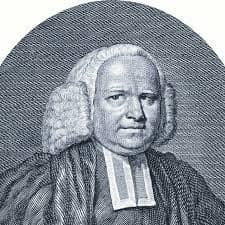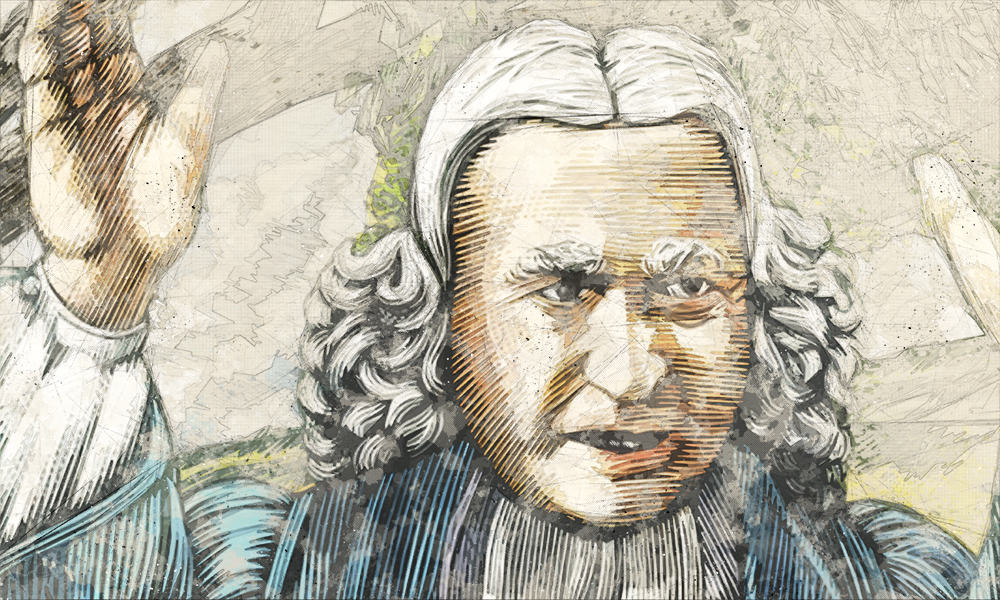Pastor Bill very kindly lent me two volumes of a biography about George Whitefield, which I have been studying with great interest despite being a relatively slow reader!
Some of you may already know of Whitefield as one of the co-founders of the Methodist movement, along with the Wesleys. I knew little of him before reading these books, but I have found his life story truly fascinating, and this has inspired me to want to do more to spread the gospel to our community.
Background on Whitefield
Whitefield was the youngest of seven children, born in Gloucester in 1714. His father died when he was barely 2 years old, then growing up he helped his mother with the family business running the Old Bell Inn in Gloucester. The building still stands there to this day, though it is no longer an inn.
The business was ultimately not very successful and, despite being academically gifted, Whitefield was unable to pay for his own education. He was only able to study at Oxford University as a “servitor”, a position whereby the student received a free education in return for essentially acting as a full-time servant for the wealthier students at the university.
In this capacity, he met both John and Charles Wesley at Oxford, and they were all members of what was coined the “Holy Club” – a fraternity which focussed on praying together, examining their spiritual lives and studying the Bible.
Whitefield had a sudden realization on reading “The Life of God in the Soul of Man” by Henry Scougal, which started him on a journey of recognition that being a true Christian went beyond merely going to Church, saying your prayers, receiving communion and so forth. A person could dutifully attend Church their entire lives, yet never make the personal commitment to accept Jesus into their hearts as their Lord and Saviour. Salvation meant having a personal relationship with Jesus Christ and believing in His sacrifice which rescued each of us from death, being the wages of our sins (Romans 6:23). After striving for years to attain salvation through his own human efforts, even suffering ill health and ending up confined to bed for a time due to all of his strivings, God led him to the realisation that salvation was simply a free gift of God.
For us Christians, it is important to recognise that our faith is credited to us as [Christ’s] righteousness – a truth which echoes throughout time, and we can even see this same truth played out right back in the early life of Abraham (see Genesis 15:6) – an event which was a key precursor to God’s ultimate plan to rescue all of humanity through faith in Christ.
Following his conversion, Whitefield went on to become ordained into the Church of England. He was a mere 21 years of age when he preached his first sermon, which he delivered with power and authority far beyond his years. What struck me particularly about his early ministry was that he never seemed to allow his relatively young age to deter him from realising his calling, even whilst a minority of people mocked him for it.
The Church of England didn’t grant Whitefield a specific parish, so he eventually engaged in preaching to crowds in the open air out in the countryside and marketplaces. He frequently met with tough opposition from the established Church of the day, many of whom saw his method of preaching as heretical and tried to discredit his ministry. In spite of this opposition, his ministry went from strength to strength, preaching to thousands of people who would specifically go to fields in the middle of nowhere simply to hear him preach.
In time he would make missionary journeys to North America, to preach to the British colonies being built there.

Background on British society in the 18th Century
Whitefield’s biography also challenged me on many inaccurate perceptions I had previously held about Britain from that period of history. I always assumed that, being a universally Christian society, Britain in the 1700s would have had very high social standards compared to today, with little public evidence of the overt sin and chaos we seem to see all around us in our world right now. That era of history always conjures up images in my mind of the incredibly civilised society depicted in Jane Austen novels and the period dramas we see on our TVs.
However, the reality was very different.
There was a serious problem with alcoholism in Whitefield’s day, in particular the notorious “Gin Craze”. One modern writer notes that: “in the mid-eighteenth century the effects of gin-drinking on English society makes the use of drugs today seem almost benign.” A pint of gin could be bought more cheaply than a pint of beer, so poorer people ended up drinking a great deal of spirits. Apparently, it was discovered at the time that the average Londoner drank 14 gallons of spirits per year! It was such a problem that parliament passed the Gin Act to try and restrict the sale of gin, but this only pushed the problem underground.
Equally false was my perception that British society in the 1700s was universally Christian. Scepticism was rife back in Whitefield’s era too, with Joseph Butler (the Bishop of Bristol) commenting at the time that Christianity was treated by many as though “it was now discovered to be fictitious… set up as the subject of mirth and ridicule”. Licentiousness, lawlessness and violence were commonplace – particularly in the inner cities. The more I read, the more I realised that it sounded so similar to the situation that Christianity is facing today.
It dawned on me that it is never too late for revival. Previous eras have faced exactly the same problems we have in our society today, and yet those societies were capable of being transformed through the power of Christ and the message of salvation. It gave me great hope for another great revival in our nation, when at times I have been tempted to despair into thinking that we’ve slipped too far to recover as a society.
I will be sure to keep praying for revival, and how God can use me (and all of us at Ridgeway Community Church) to build His Kingdom.
Lessons to learn from George Whitefield’s life and ministry
Whitefield – a man of humility
Previously we saw that Whitefield had preached his first sermon at 21 years of age, and it had been clear that Whitefield had an innate gift for studying and preaching the word, but nevertheless he didn’t presume that this was his calling and he specifically waited for God to call him into the ministry.
In one of his printed sermon’s entitled “The Good Shepherd” he writes:
“I have prayed a thousand times… that God… would not let me enter the Church before he called me and thrust me into his work. I remember once in Gloucester… I said, ‘Lord, I cannot go; I shall be puffed up with pride and fall into the snare of the devil.’ “
What is interesting here is that he recognises the temptation of those in ministry to become proud, and to potentially end up seeing the work of God as being their own success. He is clearly very mindful of this danger and ensures that he prays frequently over the matter.
Similarly, it is important for us Christians to pray regularly and seek God’s will in all that we do, and to be mindful that what we do in our calling is about serving God and building God’s Kingdom. For instance, I always try to be mindful when leading worship to avoid turning it into a performance, but I must confess there have been times in the past where I have fallen into this trap. In recent years I have tried to be more mindful that it is more important to engage the congregation in worshiping God, than to simply perform my favourite songs!
A further lesson here is that we should also never overlook the fact that God can use the very ordinary and humble to bring about the miraculous. One of the most astonishing revivals that took place during Whitefield’s ministry occurred at Cambuslang in Scotland. Here there were two faithful ministers, William McCulloch and James Robe, who had simply served God week after week in their Scottish parishes, but for many years had seen little fruit for their labours.
They were both apparently humble men, with little in the way of any exceptional abilities. The author of the biography puts it as follows:
“Robe’s abilities as a public speaker were but ordinary, and those of McCulloch were somewhat less. Indeed, it is said of McCulloch, he was given the nickname… ‘Ale-minister’ for when he rose to speak, many of the audience left to quench their thirst in the public house.”
These ordinary men, with average (to less-than-average) ability at public speaking, simply kept faithfully preaching the scriptures week in and week out. They had set the groundwork faithfully, such that when Whitefield visited Scotland in Autumn 1741, it led to a chain of events that saw a great revival in that area. Societies for Prayer which were nearly extinct were revived, with hundreds of people across the region coming back to the Lord. Even in McCulloch’s small parish he spoke of: “the awakened ones numbering at least three hundred”.
It just goes to show that humbly and faithfully planting the seeds can lead to miraculous results in the long run when the power of God moves. We all have our part to play in this, no matter how small it may seem to us at the time.

Whitefield – a man of grace
Another key lesson I learned from Whitefield’s life is how to deal with adversity in a Christ-like manner. As might well be expected, Whitefield’s popularity brought with it immense opposition. Not only from the established Church of England, but also at times between Whitefield and the Wesleys in the Methodist movement itself where they disagreed on key points of doctrine.
What particularly struck me about Whitefield, is in the way he responded to his fiercest critics. He was quick to point out his own shortcomings whenever he recognised them, and he took reproof willingly and graciously.
Here is Whitefield responding to a time when [John] Wesley had seen fit to reprove him:
“I thank you for your kind reproof. Henceforward I will beg of God to keep the door of my lips, that I offend no more with my tongue. I would not willingly have one unprofitable word proceed out of my mouth… I love you the more for reproving me.”
I can’t help but compare his attitude to my own whenever I am challenged or criticised. I am usually very quick to be defensive, or at the very least to try and explain my side of the story in a positive frame – even if deep down I might acknowledge (to myself at least) that I was probably in the wrong.
I think this stems from our modern society’s general approach to life. We are used to bolstering our successes, from our CVs to job interviews, and even in everyday conversation about our lives. We tend to emphasize our achievements and we try to paint ourselves in the best possible light in any situation.
Not so with Whitefield. He had many chances to set the record straight with his critics, not only in front of his peers back in the 18th Century but also to protect his legacy in terms of how history would remember him. However, he never particularly tries to defend himself or his reputation. He simply indicated that it was sufficient for him to know that the truth would eventually come out for all to know in “the great day of judgment.”
George Whitefield – unashamed speaker of truth
The final lesson I learned from reading about Whitefield, is that whilst he was very humble and gracious with his responses, he never compromised with the truth of the gospel in doing so.
This I believe to be one of the great challenges of the modern Church. How do we demonstrate Christ’s love to the world, yet at the same time stand firm in the truth of the scriptures?
Several denominations appear to think that it is more important to be relevant to the world, in order to maintain attendance numbers. Yet in doing so they compromise, embracing the world’s standards and neglecting the scriptures.
By contrast, let’s consider how Whitefield tackles the issue of challenging unsound doctrine:
“Reverend and very dear brother,
God only knows, what unspeakable sorrow I have felt on your account… I confess that Jonah could not go with more reluctance against Nineveh, than I now write to you. I am very apprehensive that our common enemies will rejoice to see us differing amongst ourselves. But what can I say? The children of God are in danger of falling into error… I have no respect to persons, further than is consistent with my duty to my Lord and Master, Jesus Christ.
This letter will no doubt lose me many friends… perhaps God has laid this difficult task upon me, even to see whether I am willing to forsake all for him.”
Here Whitefield goes on to provide a lengthy explanation of the scriptures, and why he believes the interpretation to be in error, before closing the letter as follows:
“God knows my heart… nothing but a single regard to the honour of Christ has forced this letter from me. I love and honour you for his sake, and when I come to judgment, will thank you before men and angels for what you have, under God, done for my soul…
Your affectionate, though unworthy, brother and servant in Christ.”
Whitefield remains humble and gracious, but equally he will not stay silent and compromise. Even if, by his own admission, it might lose him friends and having to forsake everything to defend the truth.
The question we in the modern Church need to ask ourselves is: are we willing to risk the same in standing for the truth?




